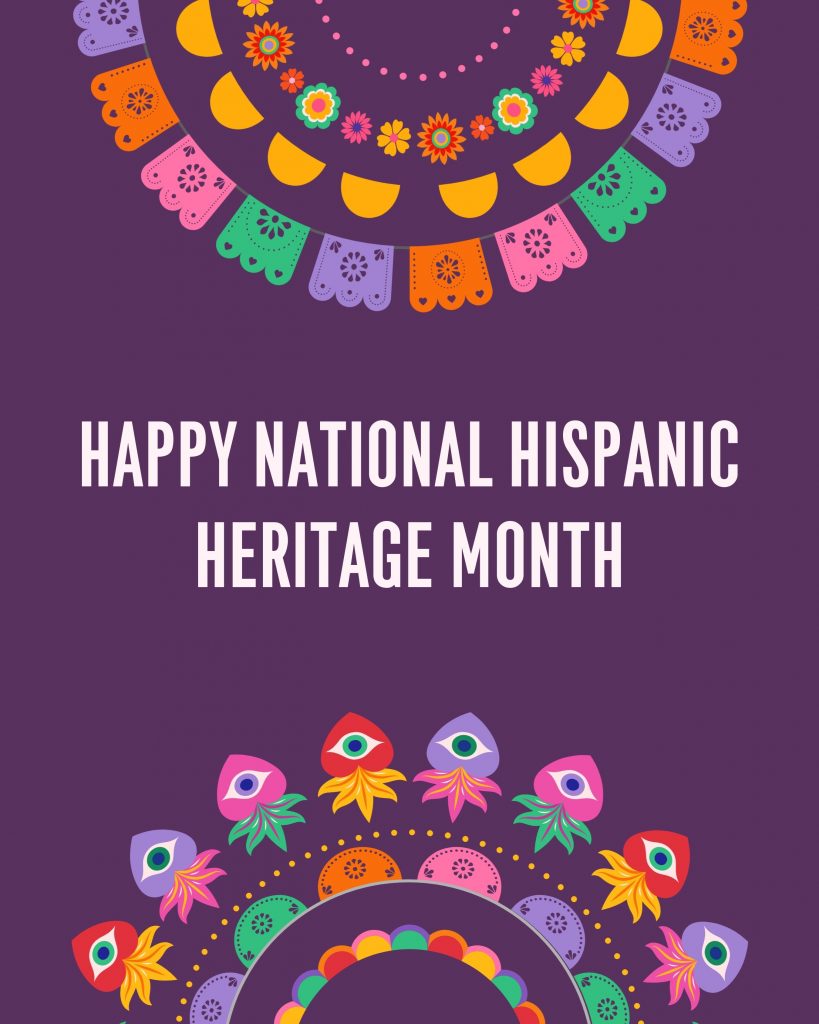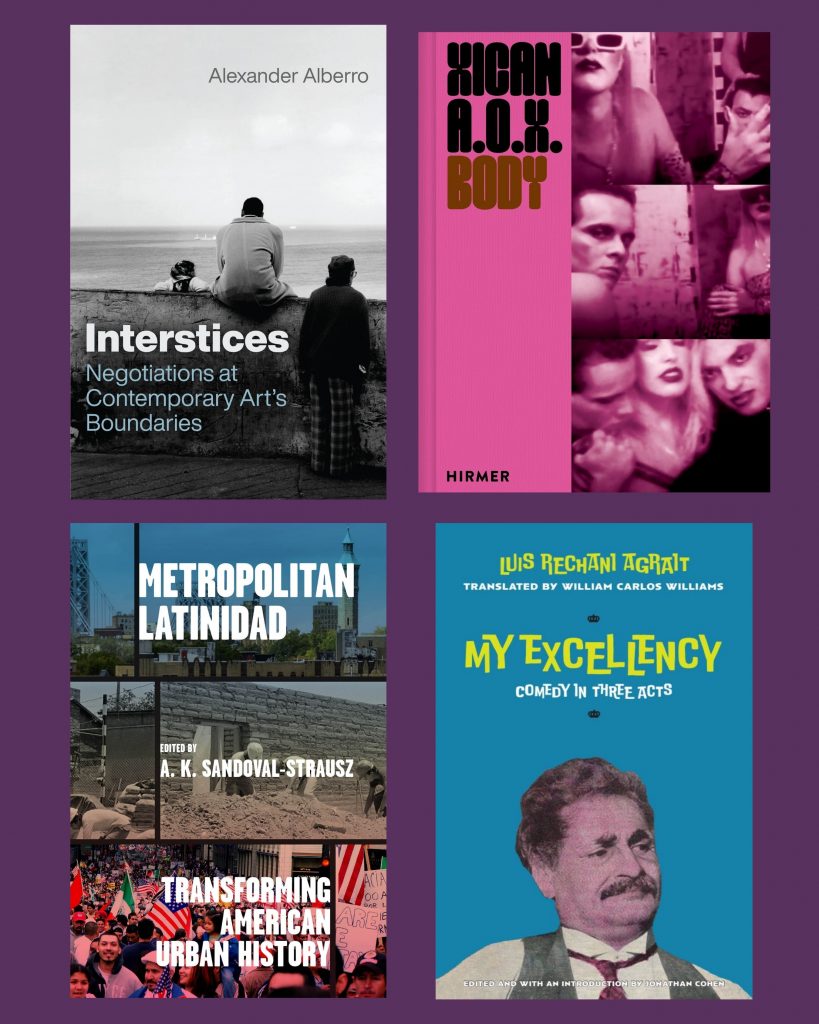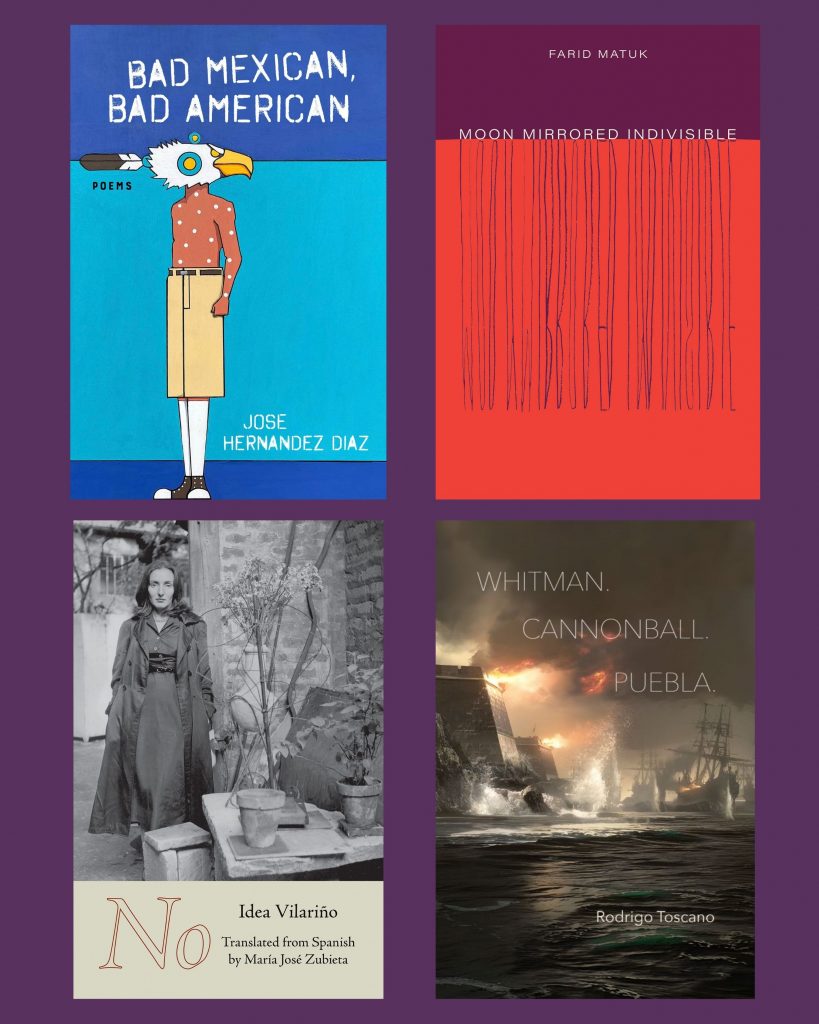To celebrate National Hispanic Heritage Month, we’ve put together a reading list highlighting books by and about Hispanic individuals and communities from a range of countries and traditions. With these books from Chicago and our distributed client presses, you can explore poetic voices, artists from Central and South America, the influence of Latinos in American cities, reflections on multicultural identity, and much more. Use the code HERITAGE30 to take 30% off the full list of books through October 15th.



From the University of Chicago Press
Metropolitan Latinidad: Transforming American Urban History Edited by A. K. Sandoval-Strausz
This wide-ranging collection of essays centers Latinos in the history of American cities and suburbs. Traversing metropolitan areas like Atlanta, Chicago, El Paso, Fort Worth, Los Angeles, Miami, and New York, Metropolitan Latinidad brings together both established and emerging scholars, including long-time urbanists and academics working in the fields of Latino, borderlands, political, landscape, and religious history.
Moon Mirrored Indivisible By Farid Matuk
“Transcendent work. Words stretch to their limits in Moon Mirrored Indivisible, making a new and necessary language for revolution. In a world preoccupied with occupation, these poems give liberatory breath. Read and allow yourself to be rearranged.”—Marwa Helal, author of Ante Body
Interstices: Negotiations at Contemporary Art’s Boundaries By Alexander Alberro
With this book, Alexander Alberro engages decolonial theory to explore the dynamic exchanges that occur where the ideals and values of different artistic frameworks meet, showing how the tensions at the edges of the Western art framework are pushing it toward its discursive limits. His examples include a range artists and collectives from around the world, including Iosu Aramburu, Mabe Bethônico, El Colectivo, Maria Galindo and Mujeres Creando, Doris Salcedo, and World of Matter.
Devotion in Motion: Pilgrimage in Modern Mexico By Edward Wright-Ríos
Through the story of a centuries-old, ever-changing Catholic shrine to Our Lady of Juquila in Oaxaca, Mexico, Wright-Ríos reveals how tradition, innovation, marketing, and devotion coexist and interact in pilgrimage. In Devotion in Motion, Edward Wright-Ríos argues that we misunderstand pilgrimage (past and present) if we ignore its dynamic relationship with the rhythms of daily life and community.
From ACMRS Press
The Bard in the Borderlands: An Anthology of Shakespeare Appropriations en La Frontera, Volume 2 Edited by Katherine Gillen, Adrianna M. Santos, and Kathryn Vomero Santos
For decades, Chicanx and Indigenous theater-makers have worked to repurpose the plays of William Shakespeare to reflect the histories and lived realities of the United States–Mexico Borderlands, or La Frontera. Celebrating this rich tradition, The Bard in the Borderlands brings a wide range of Borderlands Shakespeare plays together for the first time in a multi-volume, open-access scholarly edition, creating space to tell stories of and for this complex and important region.
From Acre Books
Bad Mexican, Bad American: Poems By Jose Hernandez Diaz
“Bad Mexican, Bad American is like quenching a thirst that for too long has gone unsatisfied. Latinos in general, and Chicanos in particular, yearn for rich, full and authentic expressions of our community. Hernández provides the perfect elixir to address this need through his beautifully drawn personal poems and his whimsically surreal prose poetry. . . . These reminders of our humanity are not luxuries that sit in libraries unread, but instead critical shields from the violence towards our Latino communities. Bad Mexican, Bad American is truly like water for all of us in a desert of headlines saying that we do not belong.”—Los Angeles Review
From Carnegie Mellon University Press
No By Idea Vilariño, Translated by María José Zubieta
In No, Idea Vilariño strips poetry to its essence—distilling love, loss, and the inexorable passage of time into spare yet searing verses. Renowned as a leading voice of Uruguay’s “Generation of 45,” Vilariño’s final collection is at once a defiant refusal and an unrelenting assertion of existence. From its stark nihilism emerges a poetic voice that insists on being heard, even as it denies life’s joys.
From Hirmer Publishers
Xican-a.o.x. Body Edited by Cecilia Fajardo-Hill, Marissa Del Toro, and Gilbert Vicario
Xican-a.o.x Body centers on the political and creative resistance of Xicanx artists from 1968 to the present. Presenting new histories of Xicanx art, the book illustrates how some seventy artists have foregrounded the Brown body to explore, expand, and complicate the Mexican American, Latinx, and Xicanx experiences, emphasizing the term Xicanx for greater acknowledgment of indigenous roots and intersectional identities.
From Omnidawn
WHITMAN. CANNONBALL. PUEBLA. By Rodrigo Toscano
This four-part collection of poetic fables engages the emerging field of global-poetics through Hispano-Americano lenses. Toscano’s poems present a cultural landscape where the Anglo-capitalist outlook is tempered—if not subsumed—by a Greater Americas “Salamanca Humanism,” which was the basis for the 1948 United Nations Universal Declaration of Human Rights.
From Park Books
Concéntrico: Urban Innovation Laboratory Edited by Javier Peña lbáñez and Nick Axel
Concéntrico: Urban Innovation Laboratory reflects on the first decade of the international Concéntrico festival of design and architecture in Logroño, Spain. This book introduces meaningful ways to address and engage with pressing urban issues—from identity and heritage to temporariness, collectivity, ecology, play, and domesticity—through the lens of selected Concéntrico commissions since 2015.
From Seagull Books
Crossings: “Varied Imagination” and “Living between Languages” By Sylvia Molloy, Edited by Diana Taylor
In Crossings, Sylvia Molloy embarks on an evocative exploration of the intricate and profound experience of living between languages, cultures, and geographies. A pioneering Argentine writer, fluent in Spanish, English, and French, Molloy inhabited all three languages, shuttling back, forth, and between, aware that each place and each language bring forth a different self.
From Swan Isle Press
My Excellency: Comedy in Three Acts By Luis Rechani Agrait, Translated by William Carlos Williams, Edited and with Introduction by Jonathan Cohen
William Carlos Williams’s “lost” translation of Puerto Rican dramatist Luis Rechani Agrait’s masterpiece. My Excellency is a political farce set in an “imaginary country” that resembles Puerto Rico during the Great Depression, with its high unemployment and labor unrest. The play focuses on the plight of an idealistic but naive man, Buenaventura Padilla, in a completely corrupt political system. Through an unscrupulous election, he becomes the nation’s leader.
The Men Who Killed My Mother | Los hombres que mataron a mi madre
Bilingual edition By Fernando Valverde, Translated by Gordon E. McNeer
These poems present a powerful account of the symbolic murder of the poet’s mother, though it quicly becomes evident that the mother in “Our Mother” (“Nuestra Madre”) is not only Fernando Valverde’s. The soulful refrain of “mother/madre” might be anyone’s mother whose suffering is palpable in a world legislated over by men. Issues such as orphanhood, abuse, violence, manipulation, and fear are treated with the rawness of someone who has tasted the venom of betrayal.
From Tupelo Press
Indifferent Cities By Ángel García
“García’s poems address themselves to the cycle of violence that arises at the many borders, both enforced and inhabited, in the US-Latino experience: between macho stereotypes and sensuous masculinity, between painful alienation and penitent acceptance, and ultimately, between loss and love. Yet for all the bruised fists, black eyes, and broken jaws here, there are no victims in these harrowing poems, as they search not for blame, but for bravery—the courage to see oneself in the mirror, and recognize our universal humanity always hungrily staring back.”—Rafael Campo, author of Comfort Measures Only
From University of Wales Press
Spectral Spain: Haunted Houses, Silent Spaces and Traumatic Memories in Post-Franco Gothic Fiction By Heidi Backes
An analysis of texts representing multiple regional cultures within Spain while examining the Gothic haunting motif in post-Franco Spanish literature.
The Female Vampire in Hispanic Literature: A Critical Anthology of Turn of the 20th Century Gothic-Inspired Tales Edited by Megan DeVirgilis
This book exposes how Hispanic authors across Spain and Latin America at the turn of the twentieth century broke from European and American Gothic models to contend with their anxieties over modernity and rising first-wave feminisms. The result was a trend of sympathetic female vampire characters, predating comparable Anglo and European representations by several decades.
